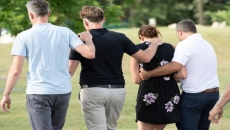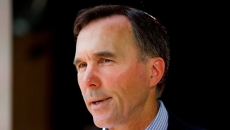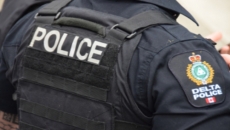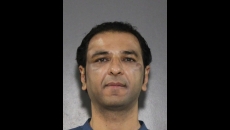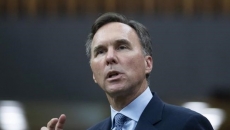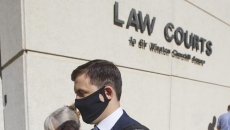What happens if Canada's minority Liberal government is defeated this fall and Elections Canada concludes it can't safely conduct an election because a second wave of the deadly coronavirus is sweeping the country?
That worst-case scenario was on the minds of some federal politicians as they watched New Brunswick Premier Blaine Higgs pull the plug Monday on his minority Conservative government, becoming the first jurisdiction in Canada to send voters to the polls in the midst of the COVID-19 pandemic.
New Brunswick's example will doubtless offer some lessons on how to conduct an election safely.
It may also embolden other federal opposition parties to join the Bloc Quebecois in its determination to bring down Justin Trudeau's government at the first opportunity.
For that matter, it may embolden the prime minister to pull the plug himself.
And it has NDP democratic reform critic Daniel Blaikie appealing to his counterparts in other federal parties to begin discussing now how best to safely conduct a federal election during the pandemic rather than sleepwalk into potential chaos.
"The worst thing would be to get to the point where we're saying, 'OK, we're having an election' and then having these disputes about the process and having somebody within the political system decide that it's in their best interests to start assailing the legitimacy of the process that's already under way," he said in an interview.
Blaikie pointed to Donald Trump's unsubstantiated assertions that mail-in ballots will result in rampant voter fraud during November's U.S. presidential election as something Canada should try to avoid.
"We don't need a political crisis on top of a public health and economic crisis," he said.
As part of its preparations for a possible election during the pandemic, Elections Canada has set up an internal working group to assess the agency's ability to conduct the vote safely - including its capacity to handle mail-in ballots, find alternative polling station locations and keep both voters and poll workers safe.
But there's only so much Elections Canada can do under current law. In a post on its website about the impact of the pandemic on election planning, the agency notes for instance that Parliament would have to change the Canada Elections Act to allow for an election to be conducted entirely by mail-in ballots.
And it adds this warning: "In an extreme case, based on the advice of public health experts, the chief electoral officer could certify that it has become impracticable for Elections Canada to administer the election in one or more electoral districts and recommend to the governor-in-council (the governor general on the advice of cabinet) that the election writ be withdrawn.
"This has never been done in Elections Canada's history."
It's that warning that particularly worries Blaikie. His worst-case scenario is that the government is defeated or Trudeau chooses to call an election, the governor general duly dissolves Parliament "and then Elections Canada says, 'We're actually not sure we can do this.'"
"So then you have a dissolved Parliament, you have an executive with no Parliament to hold it to account and how long does that go on? ... If that is a possibility, I think it's one we should all be very concerned about."
Back on June 25, Blaikie wrote his counterparts in the other federal parties asking that they work together to find a way to ensure an election can be conducted safely during the pandemic with a process that is "politically legitimate."
No one has so far responded to his letter.
"I find it kind of shocking that we've got people out there talking really strongly about wanting an election and the conditions under which they would precipitate an election when we don't actually know how to have an election properly right now."
Higgs predicted Monday that New Brunswick will have little difficulty pulling off a safe election, albeit one in which candidates don't go door-to-door or hand out pamphlets.
With fewer than 200 cases of COVID-19 and just two deaths since March, New Brunswick has been relatively unscathed by the virus, which has infected more than 122,000 and killed more than 9,000 countrywide. Moreover, the pandemic is in something of a lull at the moment - which may no longer be the case later in the fall when the Trudeau government's fate could be on the line.
The province's chief electoral officer, Kim Poffenroth, said her agency has instituted a number of measures to ensure voters' and electoral workers' safety. Among them: marking the floors at polling stations to keep voters at least two-meters apart, requiring the use of hand sanitizer when voters enter and exit polling stations, providing disposable masks to electors, requiring workers to wear masks or face shields and hiring additional workers to manage the flow of voters and to clean high-touch surfaces.
As well, she said Elections New Brunswick has cancelled polling stations in long-term care and seniors' homes and will make it easier for residents in those facilities to vote by mail. It has also stocked up on mail-in ballots.
However, should a second surge of COVID-19 cases erupt before Sept. 14, Poffenroth conceded it could impact voter turnout.
"We may have even greater challenges finding workers to work at the polls and then we may run into problems with the owners of buildings where we're supposed to have polling locations not wanting us to use those locations."
But regardless of how difficult it might become to administer the election, Poffenroth has no legal authority to recommend that it be called off - unlike Canada's chief electoral officer, Stephane Perrault.
"There's really no playbook for how to do this," she said. "It's a learning curve for both ourselves and other election management bodies across the country and we just happen to be the first ones out the gate."

